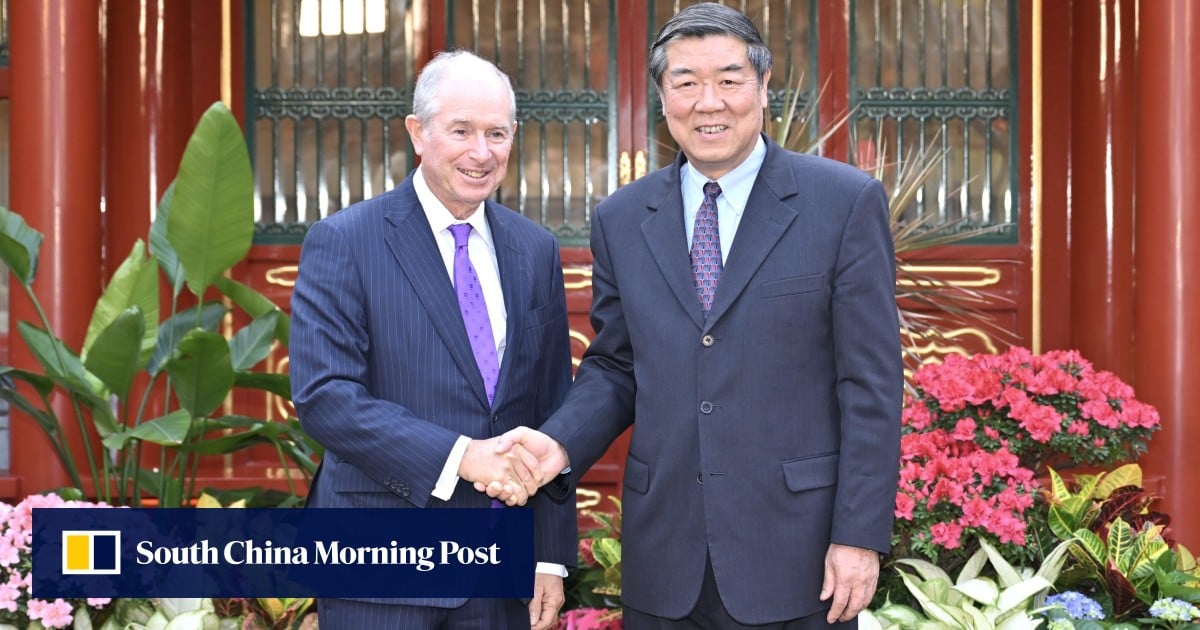China’s top leadership has gone all out to revive confidence and lure foreign investment in intensive meetings with foreign business leaders in recent days, setting out the “win-win opportunities ahead”, as Beijing seeks to achieve a seemingly challenging economic growth target for 2024.
Following routine speeches and discussions involving Premier Li Qiang and various ministers, Vice-President Han Zheng and Vice-Premier Ding Xuexiang on Monday met with a number of foreign business representatives at the two-day forum in Beijing.
China is giving a clear message to the world that it will go on opening to foreign investors
On the same day, chief of staff Cai Qi, China’s fifth-ranking official, met with Stephen Schwarzman, the CEO of private equity giant Blackstone, according to the state-backed Xinhua News Agency.
President Xi Jinping is expected to hold a meeting with a group of business leaders on Wednesday, according to reports, while Zhao Leji, China’s top legislator, will attend the opening ceremony of the Boao Forum for Asia on Thursday.
The high-profile activities send a strong signal that economic development is of central importance to the world’s second-largest economy amid geopolitical tensions with the West and widespread doubts over its growth potential, said Xu Mingqi, a professor of international economics at the Shanghai Academy of Social Sciences.
Foreign firms at China Development Forum call for action as Beijing vows changes
Foreign firms at China Development Forum call for action as Beijing vows changes
“The world has been watching if China will keep opening in the next stage, and there has been quite a lot of misinterpretation and distrust,” he said.
“Now China is giving a clear message to the world that it will go on opening to foreign investors, and that they will still have many opportunities.”
In the first two months of the year, foreign investment inflows into China dropped by 19.9 per cent from a year earlier to 215.1 billion yuan (US$29.8 billion), according to the Ministry of Commerce.
While geopolitical conflicts “will always be there”, “economic and trade relations are the most important areas that both China and the West are willing to seek common ground”, he added.
But it is widely regarded as an ambitious goal thanks to a higher base last year and various economic challenges, including huge local government debt and a prolonged property sector slump.
Xu said that the moves to woo foreign business leaders also show how China is responding to a pessimistic external environment as geopolitical risks linger and global growth is set to slow further this year.
“The leaders may not be able to compromise on Taiwan or the South China Sea, but they’re showing the determination to fix trade and economy,” he said.
“A weak economy is bad for all.”
China eases security checks for cross-border data transfers to help boost economy
China eases security checks for cross-border data transfers to help boost economy
Han Shen Lin, an assistant professor of practice in finance at the New York University Shanghai, said that aside from the China Development Forum, the participation of top-level officials in smaller meetings with business executives is “a critical confidence-building signal of how integral a partner the foreign community will be in China’s significant shift from a rapid growth focus to ‘high-quality’ development”.
“They provided clear messaging on the win-win opportunities ahead – all while keeping in perspective the lingering geopolitical and business environment concerns multinationals may have,” he added.






